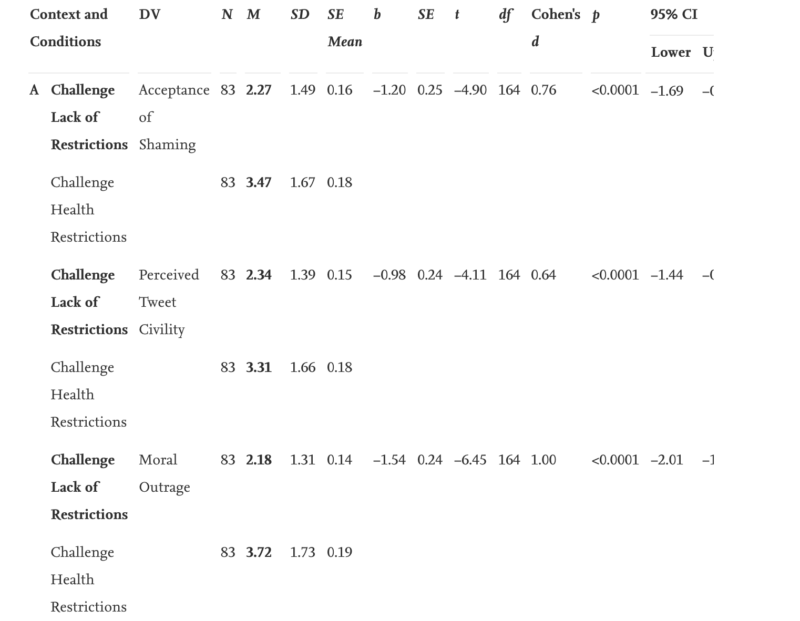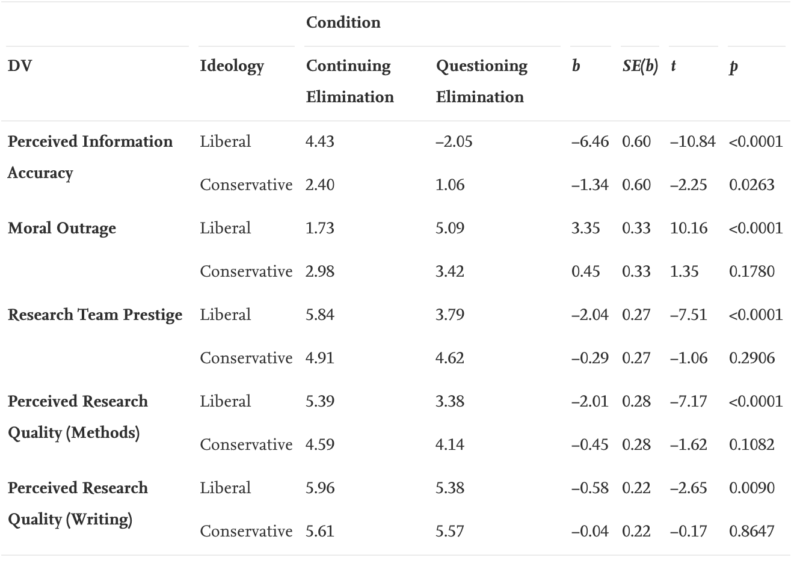Study Highlights Blinding Moral Bias Against Questioning Lockdowns

If you’ve read my work, I often compare the manner in which skeptics of the prevailing narratives surrounding Covid-19 are treated to something akin to the Salem Witch Trials or the Spanish Inquisition. Those who try to make a good faith and well-reasoned argument questioning the efficacy of lockdowns or the overall manner in which Covid has been handled are immediately condemned. It’s as if they spoke out against the church, not made a contribution to an important discussion.
Oxford Professor Sunetra Gupta shares her experience with such attacks in her article here. You can also find some of my commentary on related instances here and here. Clearly, none of this is productive at all. The entire idea of the scientific method and a free democratic society, in general, is rigorous debate, not orthodoxy.
It should come as no surprise that a recent study produced by a team of three researchers at three different universities confirms this exact problem. Personally, I would just say that people have lost their minds when it comes to Covid-19 and are not thinking rationally. A press release from the University of Otago in New Zealand puts it more eloquently,
“A collaborative study led by the University of Otago has shown that COVID-19 containment and elimination efforts have become moralised. As a result, people are more likely to accept collateral damage from these efforts, such as social shaming, lost lives and illnesses, and police abuse of power. This moralisation was so strong that people reacted negatively even when COVID-19 restrictions were merely questioned.
Published in The Journal of Experimental Social Psychology, the study, Moralization of COVID-19 Health Response: Asymmetry in Tolerance for Human Costs, examined how likely people were to overlook the harmful by-products of the elimination response, compared to similar actions unrelated to COVID-19 (e.g., reducing road deaths) or those addressing the economic impact of COVID-19.”
Rather than treating the Covid-19 pandemic like any other policy concern such as building a road, where the tradeoffs and expenses are weighed with a steady hand, many people have opted to treat it like a religion. This is problematic because policy decisions have real-life consequences and they ought to be made with proper discussion, not dogma and fervor to cleanse. Collateral damage among many other factors such as long-term economic health, human rights, and the general efficacy of a policy matter. Viewing Covid-19 in moral terms inevitably hampers our ability to have productive discussions and ultimately support the general welfare of society.
The authors of the study: Maja Graso of the University of Otago, Fan Xuan of the University of Illinois at Urbana Champaign, and Tania Reynolds of the University of New Mexico write,
“We hypothesized that because Covid-19 (C19) remains an urgent and visible threat, efforts to combat its negative health consequences have become moralized. This moralization of health-based efforts may generate asymmetries in judgement, whereby harmful by-products of those efforts (i.e., instrumental harm) are perceived as more acceptable than harm resulting from non-C19 efforts, such as prioritizing the economy or non-C19 issues.”
The authors explain that moralization can be a problem because
“When attitudes, including those regarding C19, are held with strong moral conviction, (known as moral mandates), they are perceived as objectively true and universally obligatory (Skitka, 2002; Skitka & Houston, 2001)…
If Control-C19 (refers to policies that seek to contain or eliminate Covid-19) efforts have risen to the level of a sacred value, merely questioning them should evoke strong moral outrage and opprobrium.”
Their research concludes that
“Altogether, results suggest reducing or eliminating C19 have become moralized, generating asymmetries in evaluations of human suffering.”
In summary, many people are likely to have a hindered ability to make objective judgments on the tradeoffs of various public health interventions and fairly evaluate research because of the moralization of Covid-19. This moralization is clearly skewed towards heightening the perceived danger of Covid-19 and maintaining public health interventions while being hostile to opinions that run contrary to these ideas.
Study One
The researchers employ two studies, the first based in the United States and the second in New Zealand. The results are nothing short of breathtaking.
For the first study, a sample size of 500 then filtered down to 487 individuals in the United States who were randomly assigned to respond to a variety of scenarios. They had to respond on a scale of 1 to 7 on how they felt about a certain situation. Those scenarios included how accepting they would be of the shaming of a public health expert, inaccuracies in a Covid-19 disease model, and acceptance of police misconduct. The experiment further divides the scenarios into more specific contexts such as police misconduct to enforce Covid-related restrictions and misconduct to enforce road safety, acceptance of public shaming for pro-lockdown opinions vs anti-lockdown opinions.

The following is the data from the first context in the study which is “Dr. Bloom faced online shaming, ridicule, and harassment. A disparaging tweet called his ‘recklessness’ embarrassing and claimed he should be ‘ashamed to call himself a health practitioner.”
The median answers listed in bold indicate the responses to the various questions for the context. There is a higher median acceptance for public shaming if Dr. Bloom challenged health restrictions rather than advocating for more. There’s a higher median assignment of civility for a tweet that attacks Dr. Bloom for challenging restrictions and a lower median assignment of civility for a tweet that attacks him for advocating for more restrictions. Finally, there was a higher moral outrage if Dr. Bloom was challenging health restrictions compared to if he advocated for more restrictions.
Other measured factors indicated a higher assignment of competence for advocating for more rather than fewer restrictions and overestimating rather than underestimating the effects of Covid-19. The study also noted differences in responses based on the perceived danger of Covid-19 and political ideology. It concluded that those of liberal or left-leaning political ideology were more likely to view Covid through a moralized lens and exhibit an asymmetric tolerance on various issues. More information and in-depth data can be found in the study.
Study Two
In the second experiment, 180 individuals in New Zealand were randomly assigned to evaluate a proposal suggesting that lockdowns should be discontinued; the other suggesting the opposite. Both proposals were identical in structure and contained established data. They were told to evaluate the proposal on a numerical scale of 1 (strongly disagree) – 7 (strongly agree) on factors such as perceived accuracy of the information, moral outrage, and prestige of researchers.
The authors conclude,
“Study 2 provided further support for our underlying premise that C19 health-minded approaches have been moralized, even to the point of a sacred value. Participants evaluated a research proposal empirically questioning the elimination strategy (i.e., the main strategy in NZ) as of lower value to society and of lower methodological quality compared to the proposal questioning abandoning the elimination strategy. Furthermore, participants also evaluated the research team as less competent, and were less likely to trust them in carrying out participants’ donation wishes when they hypothesized greater harm resulting from continuing (vs. abandoning) an elimination strategy.”

The following table is further disaggregated based on the political ideology of respondents. One of the striking data points is that Liberals tended to have a more extreme stance on the opposing viewpoint whereas Conservatives tended to be more moderate in their reception. This supports the earlier assertion that Liberals tended to view Covid-19 through a more moralized lens which generates asymmetrical tolerances. That is all things being constant, actions taken to forward a favored goal are more tolerated than the same actions taken in a different direction. This should not be construed to suggest that the authors believed one side is better than the other.
Liberals tended to view the pro-lockdown proposal as having more accurate information, lower moral outrage, higher research team prestige, better research methods, and better writing. Conservatives tended to exhibit the reverse except with a less noticeable difference in reception to the opposing viewpoint. Both studies were identical in structure and contained established information.
The authors note,
“Irrespective of their origin, the divergent conceptualizations of morality observed here may undermine empathy for those proffering alternative responses to C19, thereby exacerbating political polarization in the US and beyond.”
Key Takeaways
What we have seen demonstrated by this study is nothing new. Humans throughout history have moralized important issues, injecting more vitriol and passion into the discussion than what may be productive. The authors make a note that they do not endorse nor condemn the moralization of Covid-19; they simply wish to show that it does in fact exist. I think it would be fair to admit that we all have issues that we care about on a moral level, whether it be stopping Covid-19, ending the lockdowns, human rights, economic empowerment, and so on. The important thing to remember is that the moralization of Covid-19 and all other issues in part blinds us from making impartial and rational judgments. Judgment on essential matters like tradeoffs, conflicting ideas, and treating each other like human beings.
Covid-19 will come and go but the actions we take will have lasting consequences. Keeping our feelings in check will not only allow us to make smarter decisions, but walk out of this not being ashamed of how we treated each other.
Note: The authors of the study take no official stance on the merits of the moralization of Covid-19. They simply wish to highlight its effects from an objective research perspective.










